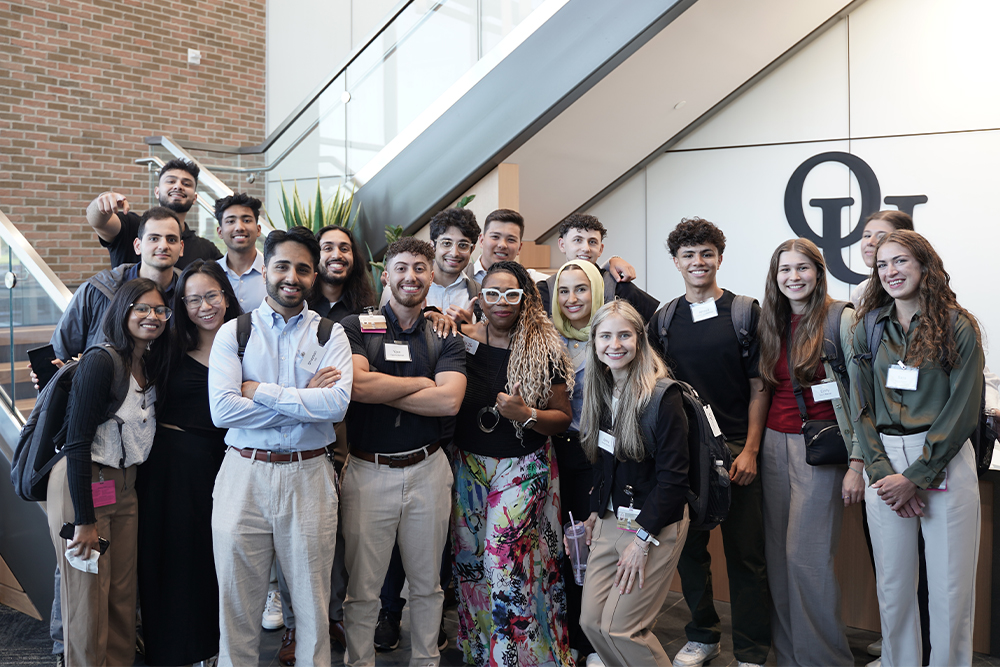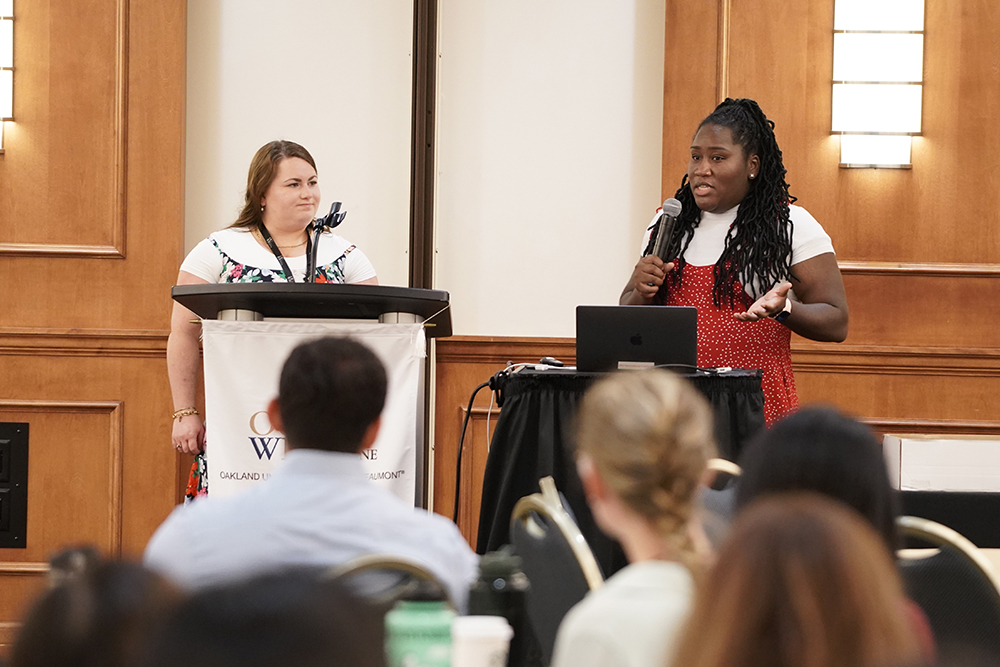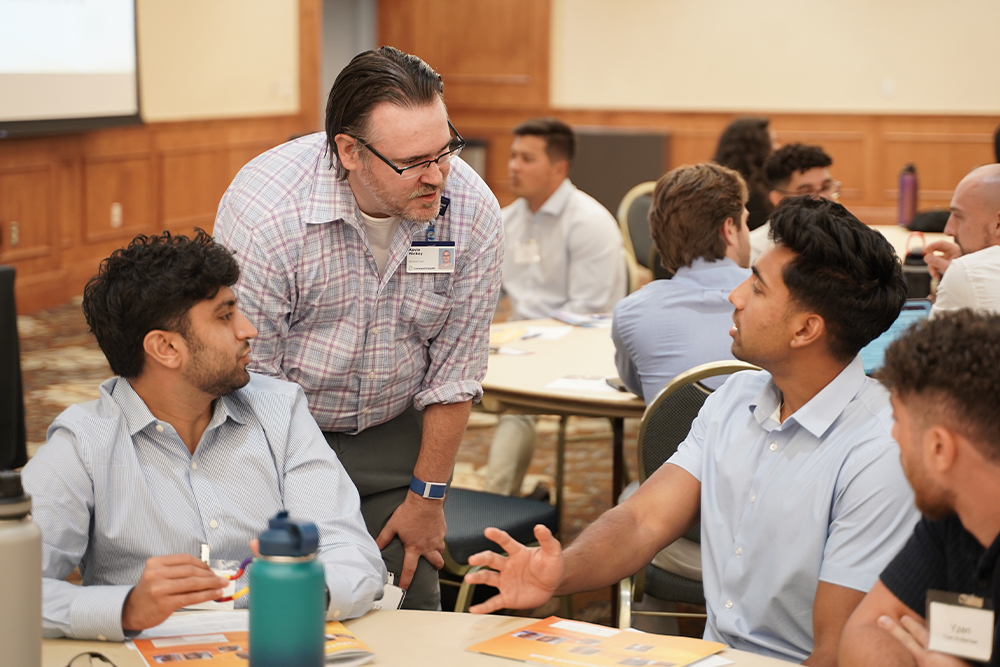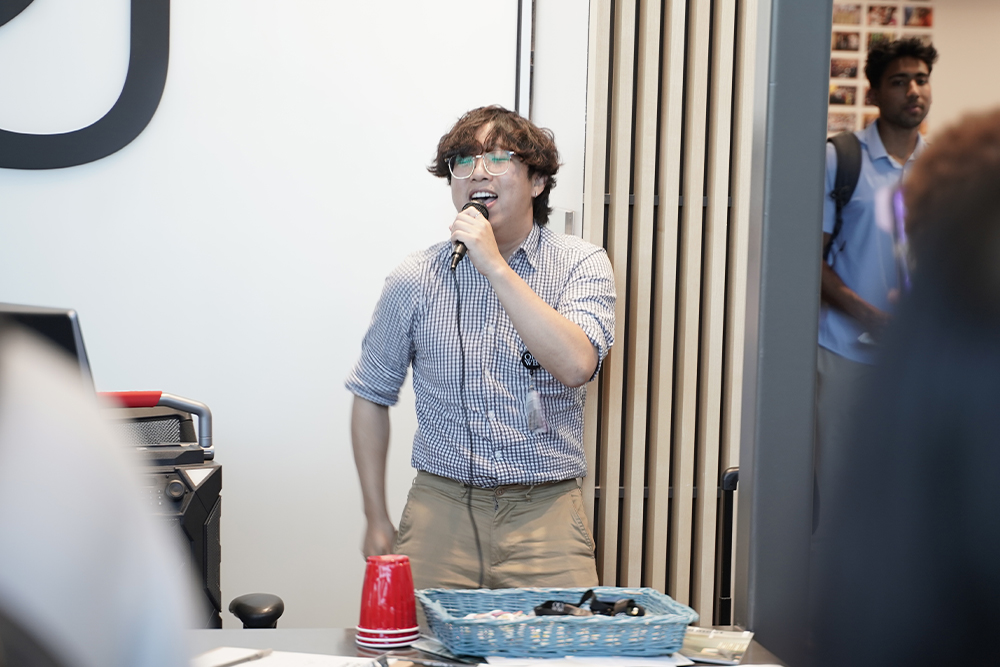
The OUWB Class of 2028 spent the last week in orientation learning details about their next four years in medical school with added emphasis on two topics: mental health and diversity, equity, and inclusion.
Sessions and events centered on both topics were interspersed throughout the week that also introduced the school’s newest class to OUWB courses, administration, faculty, and staff, resources to help them succeed, and more.
Giving students tools, resources to succeed
Berkley Browne, Ph.D., associate dean, Student Affairs, says that student mental health and well-being are priorities “because caring for our students as whole people is central to OUWB’s values.”
“Given the rigor and intensity of the M.D. program, it’s important to make sure our students are aware how important their personal well-being is for preventing burnout, compassion fatigue, and ultimately, suboptimal patient outcomes,” she says.
“These sessions are designed to give the students tools and resources at the start of their journey so they can use and refine their personal well-being practices over the next four years and carry that knowledge with them into their careers.”
In one session, counselors from OUWB introduced themselves, made the new students aware of the resources that are available to them, and led an exercise on practical ways to nurture their well-being. The session featured Janae Kinn, LMSW, and Ashley Watters, MA, LPC.
Janae Kinn (left) and Ashley Watters talk to members of the OUWB Class of 2028. |
The OUWB counselors provided background on themselves and explained what services they offer, including the days and times they are available to meet with medical students. (More information about what makes OUWB’s embedded counselors unique can be found here.) They also talked about why students might schedule sessions.
“What can you schedule a therapy appointment for? In short, pretty much anything,” said Kinn. “There is no judgment when you come to therapy. You do not have to be going through a life-altering or tragic thing.”
“We are here for you and you all have equal access to us,” she said.
Browne said it was her hope that “students took away how much programming and free mental health resources are available to them at OUWB.”
In a second mental health-themed session, officials from Corewell Health were on the campus of Oakland University to provide special training in how to spot and help others who may be thinking of suicide.
Called safeTALK, the three-hour training is designed to train attendees to be more alert to someone thinking of suicide and better able to connect them with further help. Officials say it will help the future physicians when working with patients — and each other. (More information about safeTALK training at OUWB can be found here.)
Training is delivered by members of the spiritual care team at Corewell Health William Beaumont University Hospital in Royal Oak.
Kevin Hickey answers a student's question during the safeTALK training. |
SafeTALK training sessions have been held at OUWB previously, but this is the first year it was mandatory.
“It’s important to have safeTALK training on the orientation schedule because suicide is a problem that happens every day, everywhere, anytime,” said Kevin Hickey, spiritual care manager, Corewell Health William Beaumont University Hospital, and manager, Clinical Ethics, Corewell Health East.
“The earlier we can provide the training, the more ready and equipped the student body will be," he added.
Overall, new medical students like Christina Chang said they appreciated the emphasis on mental health.
“A lot of M2s have mentioned that being an M1 is a hard transition,” she said. “The fact that OUWB gives us so many resources is definitely very helpful and makes me more optimistic about this next year.”
“It’s nice to see that they’re putting an emphasis on mental health because I feel like I have a lot of resources I can go to,” said Nandini Koneru, M1.
‘Everyone has diverse backgrounds’
Over the course of the week, several events were focused specifically on diversity, equity, and inclusion (DEI).
The sessions included a three-hour introduction and development of a community service project, a special lunch hosted by the department, and a fun-filled mixer/networking event.
Tonya Bailey, Ph. D., associate dean for diversity, equity, and inclusion and community engagement, said the DEI office found it important to introduce OUWB’s new class to its values early.
First-year medical student Jared Gong sings karaoke during the MedSoul event. |
“Our physicians are our future,” said Bailey. “This is the best time to sow seeds into them about their future and working with diverse populations, and there’s no better way to do it than during orientation.”
After students were introduced to the foundations of DEI, they had an opportunity to network with some of OUWB’s community partners.
One community partner was a direct beneficiary of the event, as the session concluded with students creating oral hygiene bags to be distributed at local shelters. These bags included regular-sized items.
“Often when donations are made, they are travel-sized. Oral hygiene is improved over time, so we want to make sure they’re able to use it more than once,” said Trixy Hall, graduate programs and community outreach coordinator.
MedSoul, a new initiative at OUWB, was the host of an ice cream social on day three of orientation. While students networked, ate delicious food, sang karaoke and played games, administrators briefed attendees on the program's details.
“MedSoul’s targeting underrepresented students in medicine, as well as first-generation medical students,” Bailey said. “The initiative’s goal is to provide a sense of belonging for students who, often in higher ed, feel lost.”
Students involved in MedSoul will engage with mentors monthly, according to Bailey. A pillar of the program is Soul Food Fridays.
“It’s about being a cultural experience,” said Bailey. “Students get to have a meal with doctors and professionals while getting to unwind and be their authentic selves.”
Day four’s luncheon, with food from Panda Express, began with Inaya Hajj Hussein, Ph.D., associate professor and global health director, informing students of the many opportunities provided through the school’s Global Health initiative.
After Hajj Hussein, Jean Szura, Ph.D., director of service learning, provided information regarding OUWB’s Summer Internship Program.
Students expressed appreciation for the sessions.
“Everyone has diverse backgrounds, and it’s really cool to see where everyone has come from and what brought them to medicine,” said Sarah Mansour, M1.
For more information, contact Andrew Dietderich, senior marketing specialist, OUWB, at [email protected].
To request an interview, visit the OUWB Communications & Marketing webpage.
This work is licensed under a Creative Commons Attribution-NonCommercial 4.0 International License.




